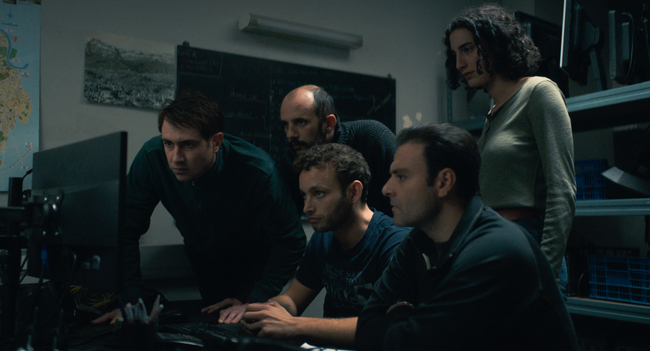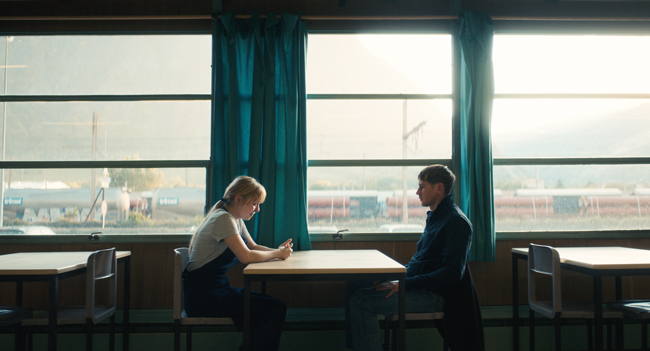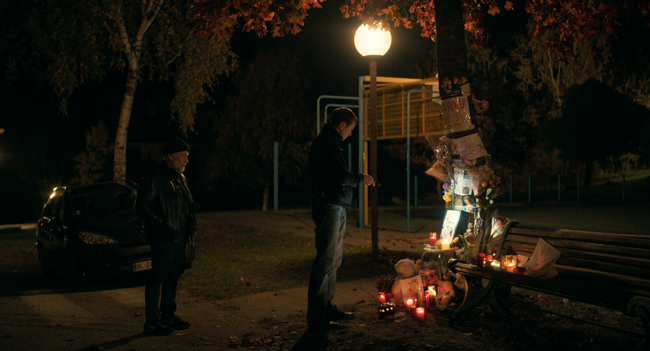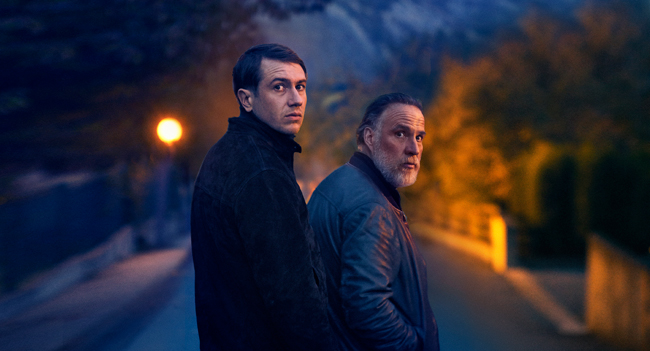Film Review: La Nuit du 12
- SUBSCRIBE
- ALREADY SUBSCRIBED?
BECOME A BONJOUR PARIS MEMBER
Gain full access to our collection of over 5,000 articles and bring the City of Light into your life. Just 60 USD per year.
Find out why you should become a member here.
Sign in
Fill in your credentials below.
During gorgeously sultry Paris summertime, folks still like to escape the outdoor heat in an air-conditioned cinema. The A/C may contribute to the climate change resulting in record drought and raging forest fires, but the summer film fare takes our minds off that for a couple of hours. Often that fare is as light as a soufflé: farcical comedies and American action-hero fantasies. Personally, I prefer easing into the atmosphere of a dark thriller — but a pure, slick genre film that works as smoothly and powerfully as a Lamborghini. (No heavy social commentary, please.) La Nuit du 12 (literally The Night of the 12th) is surely that, at least for most of its duration.
Dominik Moll’s film begins as an expertly tooled police procedural set in Grenoble and environs. A young girl has been burned alive by a hooded maniac as she’s coming home from a party. The scene is graphic, between slasher movie and war-zone video footage, but elegantly, somehow compassionately, filmed. There’s no more grisly violence after that initial sequence (that was more than enough). The scene switches to the police investigating the crime, the plainclothes force called the “PJ”, police judiciaire. At a retirement party for the unit’s commander we see a hand-over of the leadership baton to Yohan Vivès, played by Bastien Bouillon, a 30-something officer. There’s a good deal of male banter and references to les gars (the boys) — one of Moll’s concerns is toxic masculinity in and out of the police.
The film impressively depicts the methodical investigation, search for clues about the night of the murder, interviews with persons of interest. There’s also spectacular mountain scenery, beautifully filmed, normally a bugaboo of mine: nice but unnecessary landscape shots in movies partially subsidized by France’s regional governments. But here it’s evocative of the mind-set of the characters: open, craggy, precipitous, twisty like the mountain roads. The night-time cinematography is extraordinary: clean and meticulous, but still atmospheric, evocative, and spooky.
The provincial police procedural alone is enough to engross the viewer. But gradually, the director takes us into the psyches of characters caught up in the aftermath of the murder. Clara, the victim, seems to have been an ordinary girl, but also a troubled person attracted to “les bad boys”. Her young set seems to be fecklessly, callously part of a hook-up scene. The people interrogated are not so much Hollywood villainous as genially reptilian. Eventually there are run-ins with more likely suspects (which we feel is why they’re probably not guilty).

Still from La Nuit du 12 © Haut et Court
The cops of the PJ have troubles of their own. Yohan’s underling Marceau (affectingly played by Bouli Lanners) is going through a marital collapse driving him to the brink of a breakdown. Bastien Bouillon is no less than terrific as Yohan. His character is attractive, human, intelligent, but very self-contained. He’s a loner given to obsessive cycling on a track (like a hamster on his wheel, as Marceau says). Yohan has issues, obviously, but what they are is less obvious. We see him looking at an image of a young girl. His own daughter? Another image of the victim? A different victim? Director Moll, who also wrote the script (with Gilles Marchand), admirably refuses to spell things out, but doesn’t give us much of an inkling.
The police procedural ultimately winds up noirish anti-procedural, with a feminist tinge. Moll criticizes the police for being too toxic-masculine, but this isn’t convincing. The cops aren’t especially macho or violent (French Connection or LA Confidential this is not). There’s Tarantino-type banter, and unhealthy relationships (not only Marceau’s break-up, but a young officer’s immature reasons for marrying his partner). Not very edifying, but hardly a toxic-waste dump of the emotions.

Still from La Nuit du 12 © Haut et Court
At one point Yohan blows up at a colleague who intimates that Clara was attracted to dangerous men — in effect blaming the victim. With all due respect to our hero: No. That certain persons, male or female, keep bad company is a fact. Most of us will shake our heads, psychologists might analyze. But for the police it’s a question of tracing a victim’s predispositions in order to track the victimizer.
The argument is pursued several years later, when the crime is a cold case that still haunts Yohan. This part is not just a chronological continuation but the second panel of a diptych. To a great extent it’s the distaff side: Marceau is gone, having had enough (he’d originally wanted to be a French teacher). In his place is an investigating judge, played in a prim but tough-minded way by Anouk Grinberg. Also Nadia (Mouna Soualem), his new right-hand woman, of North African descent, soulful but not drippy, down to earth without being earthy. Both women have common sense and decency coming out of their pores. Now, with a more balanced PJ, we’ll get to the bottom of this can of worms! We do get hold of a few more night-crawlers. But not the Conqueror Worm at the root of the homicide, and still at large.

Still from La Nuit du 12 © Haut et Court
Yohan (and presumably Moll) pole-vault over the gender divide, with an indictment of the male sex and of himself. We’re all guilty! Once again: No. If we’re all guilty then no one is really guilty. That’s one person’s (man’s) opinion, and it says something about the forceful intelligence of La Nuit du 12 that it’s not just “provocative” but really provokes. Even if the movie’s thesis doesn’t grab the viewer, there’s much to admire: inspired casting and performances from the stars down to the smallest supporting roles, implacably assured camerawork, rigorous structure despite the murky subject. La Nuit du 12 is the best French noir I’ve seen since Dominik Moll’s brilliant debut, With A Friend Like Harry.
Lead photo credit : La Nuit du 12 © Fanny de Gouville
More in Dominik Moll, film review, french cinema, French film





